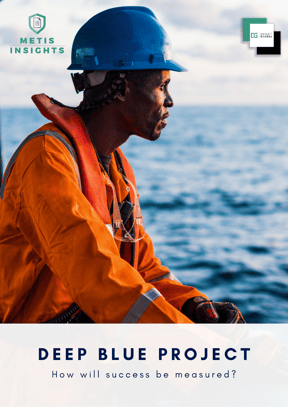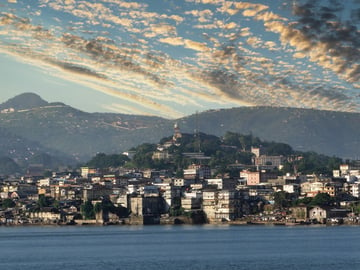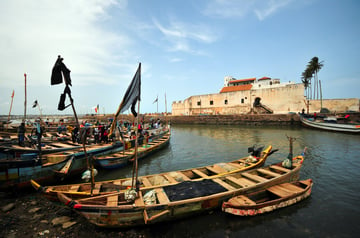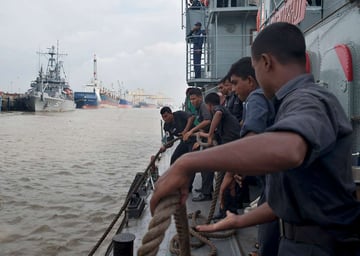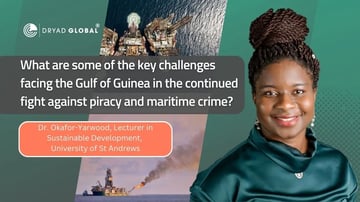Deep Blue Project
How will Nigeria's maritime security initiative be measured?
Free Download
Weekly Maritime Threat Assessment
The security tool for the maritime professional
Free Download
METIS INSIGHTS: Deep Blue Project
How will Nigeria's maritime security initiative be mesaured?
Nigeria’s delayed ‘Integrated NationalSecurity and Waterways ProtectionInfrastructure’ framework, also known asThe Deep Blue Project (DBP), is finally set to commence this month, several years after it was first announced.The DBP is highly anticipated as it represents a comprehensive enhancement of Nigeria’s maritime security capabilities, which is intended to curb piracy, robbery, kidnapping, oil theft, smuggling, and illegal trafficking of drugs and persons within its territorial waters and exclusive economic zone. Whilst the aims of the DBP are multifaceted, the primacy of effort is without question the fight against piracy and the delivery of enhanced safety of life at sea.
What does the launch of the $195m DeepBlue Project mean for piracy in West Africa?
Nigeria’s delayed ‘Integrated NationalSecurity and Waterways Protection Infrastructure’ framework, also known asThe Deep Blue Project (DBP), is finally set to commence this month, several years after it was first announced.The DBP is highly anticipated as it represents a comprehensive enhancement of Nigeria’s maritime security capabilities, which is intended to curb piracy, robbery, kidnapping, oil theft, smuggling, and illegal trafficking of drugs and persons within its territorial waters and exclusive economic zone. Whilst the aims of the DBP are multifaceted, the primacy of effort is without question the fight against piracy and the delivery of enhanced safety of life at sea.
Its launch will see Nigeria consolidate its role as the leading force in fighting piracy offshore throughout the region. However, it comes at a time when the EU has recently launched its Coordinated Maritime Presence initiative which is soon to be expanded with a Danish frigate.This indicates that extra-territorial states with interests in the region are beginning to shoulder some of the responsibility due to a shortfall in collective responsibility of Gulf ofGuinea littoral states.With mounting international pressure onNigeria and the wider Gulf of Guinea states to facilitate greater security within the maritime domain, it is vital that projects like the DBP are evaluated against their potential for success as a framework contributing to wider regional security rather than at a merely national level.Further still, it is vital to look at the evolution of risk within the Gulf of Guinea to understand how effective such a framework may be in delivering long term sustainable security to mariners throughout the region.
The DBP was first initiated in 2017 by theMinister of Transportation, Rotimi Amaechi.One of the first steps involved the NigerianGovernment approving a maritime securitycontract with Israeli firm HLSI SecuritySystems and Technologies Limited for assetprocurement and leasing. In 2020, Amaechi requested further funds to hire fast intercept vessels for one year, claiming the$195 million already approved for the same purpose had been put on hold due to COVID-19. In total, Nigeria has allocated a tenth of its defence budget to the DBP and is expected to deploy an increased range of assets to tackle maritime insecurity including two Special Mission Vessels, seventeen Fast Interceptor Boats, twoSpecial Mission Aircraft, three helicopters, four unmanned aerial vehicles and sixteen armoured vehicles. Furthermore, to bolster intelligence gathering and sharing efforts, a command, control, computer communication and information centre (C4i)has also been set up in Kirikiri, Lagos.METIS INSIGHTS 202104Against the backdrop of such a significant investment in infrastructure and capability, it is logical that at a rudimental level, key outputs from theDBP are likely to include increased monitoring and more frequent patrolling, allowing Nigeria to exert a greater operational footprint throughout its offshore domain. Through its investment in a C4i centre it is likely that Nigeria will have greater capacity to develop a reactive posture in response to developing incidents and coordinate activity with neighbouring states.Finally, through its political investment on shore it is likely in turn to result in a greater focus on maritime domain awareness and thus lead to a reduction in the ‘sea blindness’ that has hampered efforts to date.
Determining the success of the DBP in terms of improving maritime security within Nigerian waters, and indeed at a regional level, is however a more complex task than may first appear.To effectively benchmark success, one must move beyond reductionist models that equate a decline in offshore incidents in the Nigerian TTW and EEZ as being a de facto indicator of successful outcomes resulting from the DBP.Well established trends throughout the Gulf of Guinea clearly show the fluid and dynamic nature of piracy. This can be seen in terms of pirates’ ability to select areas of operations based on a knowledge of the current limitations of the in-place security architecture, and their ability to mount increasingly complex operations within areas far removed from their centre of gravity. Indeed, further evidence indicates that whilst the majority of incidents now occur beyond Nigerian waters, pirates themselves continue to originate almost exclusively fromwithin Nigeria.For the DBP to be able to claim success, Nigeria must achieve more than simply driving piracy into neighbouring waters, it must ensure that the current areas of the southern Niger Delta that are allowing Nigerian pirates the freedom of movement to mount and sustain complex kidnap for ransom operations are themselves secured and further still, the conditions within those areas that drive individuals towards piracy are addressed accordingly.
Whilst any attempts to improve maritime security offshore Nigeria is welcome, it is also the case that the largely military approach to counter-piracy that dominates much of the DBP, risks ignoring the complex interrelationship of socio-economic and governmental factors that drive piracy and maritime crime. Hence why the conventional wisdom in counter-piracy discourse states that the roots of piracy should ultimately be addressed onshore. Land-based counter-piracy approaches can involve programmes which focus on capacity building for law enforcement and policing, or a development model, focussing on preventive programs or alternative livelihood projects.
As a signatory to the legally binding Lomé Charter, Nigeria should be committed to put in place measures that that address Chapter 2,Article 5 of the Lomé Charter. This section of the charter recommends that parties put in place measures that “create productive jobs and eliminate extremepoverty”. The Charter also advocates for stronger social cohesion through equitable policy implementation. The objective of effectively combatting piracy offshore whilst failing to address the complex socio-economic and governmental issues that are widespread within Nigeria is alarmingly reductive in its approach.
What's next?
By implementing the DBP, Nigeria should be commended for taking such a considerable step towards safeguarding its offshore domain, however real success in addressing piracy throughout the Gulf of Guinea will likely only be realised when littoral states effectively and collectively respond to the onshore and offshore drivers of piracy, whilst strengthening regional frameworks and providing a system of collectivised security.Until such time, national projects occurring in isolation will only seek to drive piracy elsewhere throughout the Gulf of Guinea and fail to deliver the required safety of life at sea. Even with the implementation of the DBP, regional cooperation with frameworks such as the GOG-MCF/SHADE and ECOWAS, remain necessary. Without this cooperation, pooling of resources and consideration of how regional responses might be harnessed to promote region-wide, land-based counter-piracy initiatives, piracy will continue to plague the Gulf of Guinea.Large scale projects with considerable military hardware go a long way to addressing the resource scarcity that have thus far undercut offshore counter piracy efforts, however without a mechanism whereby such assets are used to regional effect and in conjunction with a clear strategy for addressing the issue of piratical freedom of movement within coastal areas, the issue is likely to continue.
Latest West Africa Security News
Featured in Channel16
Re-Imagining Africa’s Agency in Global Maritime Security
Maritime Security Cyber Security Maritime Piracy West Africa South Africa north africa East Africa Durban Horn of Africa
To address rising maritime security challenges along the African coastline, including the capture of the fishing vessel Almeraj 1 off the coast of Somalia, the Indian Ocean Commission (IOC) and Republ...
Coastal waters turning into ‘world’s biggest transnational crime scene’
Africa's coastal nations are grappling with a surge in illegal, unreported, and unregulated (IUU) fishing, piracy, and drug smuggling, transforming African waters into a hub for transnational crime, a...
Nigeria, 3 Others Launch Operations to Combat Sea Piracy
Maritime Piracy Nigeria Kidnapping gulf of guinea West Africa Guinea Nigerian Navy armed robbery
Nigeria, Benin Republic, Togo, and Niger Republic have joined forces to inaugurate “Operation Safe Domain II,” a collaborative effort aimed at eradicating piracy and maritime crimes in the Gulf of Gui...
Dryad Global Annual Report: Key challenges facing the Gulf of Guinea
Dryad Global's CEO Corey Ranslem talks to Dr. Okafor-Yarwood about the key challenges facing the Gulf of Guinea in the continued fight against piracy and maritime crime. In 2022, incidents of piracy a...
Free Download
Weekly Maritime Security Threat Assessment
The free infographic tool for maritime professionals


